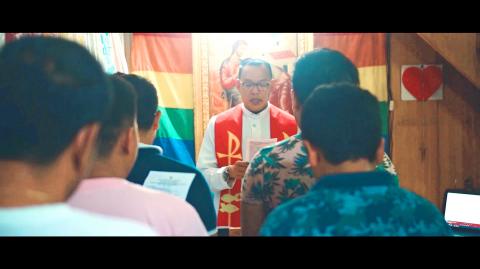With more than 800 titles in its catalog, GagaOOLala appears to be thriving in its mission to become “gay Netflix,” just a month shy of its second birthday. However, founder Jay Lin (林志杰) says there’s another component of Netflix to emulate — expanding the platform’s original content beyond Taiwan.
“Netflix’s strategy includes finding suitable topics in other countries and empowering local directors to find and tell the stories,” Lin told the Taipei Times.
Last month, GagaOOLala launched its Queer Asia series, an extension of its Queer Taiwan mini-documentaries, which looks at marriage equality as well as other less-explored topics such as drag queens, sexual services for disabled people and same-sex couples raising children. The Hong Kong and Philippines editions are already available for free on GagaOOLala, with Japan and Vietnam coming next.

Photo: PORTICO MEDIA
“We wanted to start with relatively LGBTQ-friendly countries,” Lin says. “We’re not going to go straight to [socially conservative countries] such as Brunei and Malaysia; that will cause us too much trouble.”
PROGRESSIVE SOFT POWER
With homosexuality still illegal in her country, Malaysian director Gan Li-ling (顏莉玲) can only dream of filming Queer Malaysia one day. She has to be discreet while screening her Queer Taiwan and Queer Hong Kong productions back home, mostly relying on invitations from LGBTQ-friendly schools, bookstores and coffee shops.

Photo: PORTICO MEDIA
“I’m always surprised by the variety of people who attend these screenings,” Gan says. “One can only imagine how desperate people are to openly discuss LGBTQ issues in Malaysia.”
Lin says GagaOOLala generates much interest in these conservative countries because as an Internet-streaming-only OTT (over-the-top) media platform, it is free from local censorship laws. Lin says there have been no problems with local governments since GagaOOLala keeps its advertising lowkey and social media-oriented, and also consults with LGBTQ leaders in each target country.
Despite suffering a setback during Saturday’s elections, when voters passed three referendums by anti-marriage equality groups, Taiwan’s progressiveness in LGBTQ issues is an important source of soft power that can potentially influence neighboring countries, Lin says. In addition to the Grand Council of Justice’s ruling for same-sex marriage to become legal by May next year, Lin says the LGBTQ community has relatively high representation in local productions, whether it be a “very gay” movie or inclusion of LGBTQ characters in mainstream productions.
“In many countries, you can’t even have a homosexual minor character,” Lin says.
Through Queer Asia, Lin hopes that people can look beyond their own countries to learn from the different successes and struggles of LGBTQ communities elsewhere. For example, while the LGBTQ community in Hong Kong is less visible and same-sex marriage is still illegal, its Court of Final Appeal ruled in June that immigration authorities should recognize existing same-sex marriages and civil partnerships when it comes to foreigners applying for spousal visas.
BEYOND TAIWAN
After completing the Queer Taiwan series, Gan turned her focus to Hong Kong. Like the Taiwan series, Queer Hong Kong began with an overview episode covering a number of personalities, moving on to the late lesbian pop star Ellen Joyce Loo (盧凱彤) and LGBTQ foreigners, contrasting between Western white-collar workers and Southeast Asian migrant laborers.
Gan says that on the surface, Hong Kong’s LGBTQ scene is pretty similar to Taiwan’s. But due to the lack of democracy in Hong Kong, LGBTQ rights is often not the first priority for social activists there. She also noted that interviews with Taiwanese take a lot longer because they often wear their hearts on their sleeves and speak from a personal angle, while Hong Kong activists are more deliberate and objective.
“The first episode paints a general picture of the scene with local Hong Kong activists, but as we delve into other ethnic groups, viewers start to see the huge contrasts that exist in the same city,” Gan says.
Japan is included because of its close ties with Taiwan, the popularity of its culture in Asia and as a tourist destination. Lin says that Japan is also ahead of Taiwan in certain ways — in 2011, Japan for the first time elected two openly gay male politicians to office.
Since many people are enamored with Japanese culture, Queer Japan looks at subcultures such as “boys love,” a homoerotic genre of manga and anime targeted at women.
As for the Philippines, Lin says it is contradictory — it’s the most Catholic country in Asia, but has a prolific LGBTQ film industry and has many popular LGBTQ celebrities. Meanwhile, Vietnam is an officially atheist country that lifted a same-sex marriage ban in 2015, although it still does not recognize such unions.
Before moving on to the rest of Asia, Lin plans to launch an international crowdsourcing platform for film talent to facilitate more original productions from different countries. His company is also trying to figure out how to bring these documentaries to more mainstream viewers, starting by putting some episodes on YouTube.
“We don’t just want to be an LGBTQ movie platform,” Lin says. “Although we’ll still focus on LGBTQ issues, we hope to get more general interest in these topics. It’s still hard to advertise as many mainstream media outlets are reluctant to offend their investors or business partners. And due to social media algorithms, people who don’t follow LGBTQ issues won’t receive our ads. How do we cross over to the silent majority?”

Towering high above Taiwan’s capital city at 508 meters, Taipei 101 dominates the skyline. The earthquake-proof skyscraper of steel and glass has captured the imagination of professional rock climber Alex Honnold for more than a decade. Tomorrow morning, he will climb it in his signature free solo style — without ropes or protective equipment. And Netflix will broadcast it — live. The event’s announcement has drawn both excitement and trepidation, as well as some concerns over the ethical implications of attempting such a high-risk endeavor on live broadcast. Many have questioned Honnold’s desire to continues his free-solo climbs now that he’s a

As Taiwan’s second most populous city, Taichung looms large in the electoral map. Taiwanese political commentators describe it — along with neighboring Changhua County — as Taiwan’s “swing states” (搖擺州), which is a curious direct borrowing from American election terminology. In the early post-Martial Law era, Taichung was referred to as a “desert of democracy” because while the Democratic Progressive Party (DPP) was winning elections in the north and south, Taichung remained staunchly loyal to the Chinese Nationalist Party (KMT). That changed over time, but in both Changhua and Taichung, the DPP still suffers from a “one-term curse,” with the

Lines between cop and criminal get murky in Joe Carnahan’s The Rip, a crime thriller set across one foggy Miami night, starring Matt Damon and Ben Affleck. Damon and Affleck, of course, are so closely associated with Boston — most recently they produced the 2024 heist movie The Instigators there — that a detour to South Florida puts them, a little awkwardly, in an entirely different movie landscape. This is Miami Vice territory or Elmore Leonard Land, not Southie or The Town. In The Rip, they play Miami narcotics officers who come upon a cartel stash house that Lt. Dane Dumars (Damon)

Today Taiwanese accept as legitimate government control of many aspects of land use. That legitimacy hides in plain sight the way the system of authoritarian land grabs that favored big firms in the developmentalist era has given way to a government land grab system that favors big developers in the modern democratic era. Articles 142 and 143 of the Republic of China (ROC) Constitution form the basis of that control. They incorporate the thinking of Sun Yat-sen (孫逸仙) in considering the problems of land in China. Article 143 states: “All land within the territory of the Republic of China shall